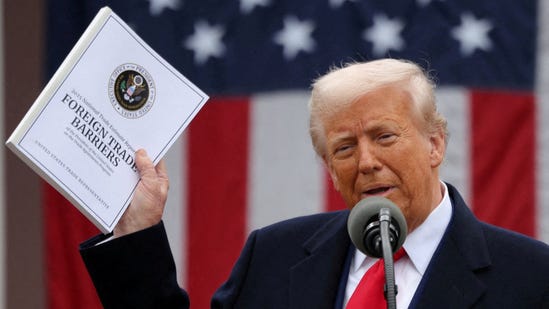Thoughts on Liberation Day & its Consequences
Trump Makes America Less Exceptional & The Great Rotation Turns Faster
Yesterday, Trump did it. He did the thing that we were to take seriously but not literally.
I wrote recently about the Great Rotation, Liberation Day just got things spinning quicker.
This is how I summarised it this morning:
The only thing to happen overnight was an attempt by the US administration to completely overhaul the world trading system and defray the burden of being the world’s hegemon among the other trading nations. Nothing to see here!
The intent behind Liberation Day should not surprise anyone who has followed Trump’s heterodox views on trade policy for the last 35 years. What has surprised most Western politicians and their media cheerleaders is that he is actually doing it. Perhaps they should have taken Trump seriously AND literally, after all.
What remains uncertain is how effective the strategy execution will be and what financial risks result from policy errors and unintended consequences. This question is much trickier to comprehend and is why we have heightened financial market uncertainty.
So far, markets are extending the trends apparent in recent weeks, indicating investors are feeling their way to a view about these significant policy changes from the world’s biggest economy. However, the time frame for a global economic reordering, akin to the consequences of the collapse of the Berlin Wall, is measured in decades, not months. From an investment perspective, the defining skill is taking the signal from the noise of relative price moves.
Overnight, the DXY weakened, US Treasury yields fell (bond prices rose), and US equity markets fell. Meanwhile, the recent haven asset of choice, gold, remained relatively steady in markets characterised by traders limiting risk exposure, prompting increased liquidity.
The tariff measures announced put the UK in the lowest sanction category with a flat 10% rate. If Starmer can resist calls to join the knee-jerk reaction to meet fire with fire over these measures and execute the bilateral trade deal No. 10 is working on, then the UK could be in a strong position. Such an advantage could provide a catalyst to prompt capital back into the UK equity market.
Overnight, the Pound rose by 1.5% against the dollar, and 10-year gilt yields fell 10 bps as futures markets imply a near 90% chance of a rate cut at the next MPC meeting—time to hold one’s nerve.
As the US markets opened this afternoon, it became apparent how unprepared investors were for this event. This is America’s Brexit. This is when global investors re-assess their belief in American Exceptionalism, or at least the price they are being asked to pay for it. As with Brexit, rational economic man cannot comprehend the degree to which some are prepared to take short-term pain for their longer-term ambition. In this case, the price the US administration is prepared to pay to restore manufacturing jobs to Detroit and the wider US rust belt. This is MAGA 2.0 in action and damn the torpedos!
Equities, particularly highly rated US ones, are going down. Apple has opened 8% down; that’s $240 billion of value! Amazon, Meta and JPMorgan are all down by similar amounts. The NASDAQ 100 is down 4.5%, and the S&P 500 4%.
Other markets have been impacted, but typically by less. The FTSE 100 is down just 1.6%.
The dollar is down over 2%, and US treasury yields are 20 bps lower, heading for the 4% handle.
At times like this, markets are like that pint of Guinness that has just been poured. It’s sitting on the bar, sorting itself out, waiting for that delicable creamy head to emerge, ready for full enjoyment. But for now, things have been knocked out of kilter.
Just consider a senior person at Amazon interested in buying a Ferrari. He’s doing well at work and is paid well, much of which comes in the form of stock-based compensation, and the car of his dreams is at last affordable. Well, so he might have thought. The terms of this trade have just moved against him by c. 80%. Amazon stock (his currency) is down 25%, the $ is 9% lower against the Euro, and his importer must pay a 20% country tariff and a 25% auto tariff at the US border.
This raises a wider point about US consumer expenditure and the wealth effect of the US stock market. We know that the market and the economy are NOT the same; however, the US economy is hyper-financialised, and nearly 50% of total consumption is derived from the 10% wealthiest cohort. This cohort is disproportionately paid in equity.
Consulting Grok, I estimate that last year, 5-7% of total consumer spending and 8-10% of US income tax was derived from stock-based compensation. Suddenly, the US isn’t looking as exceptional, and other asset classes are being identified. We have seen a dash for cash or at least into bonds. However, as the pint of Guinness nears that perfect state, other more stable equity assets will soon attract attention.




